新概念句型
- 格式:doc
- 大小:49.50 KB
- 文档页数:6
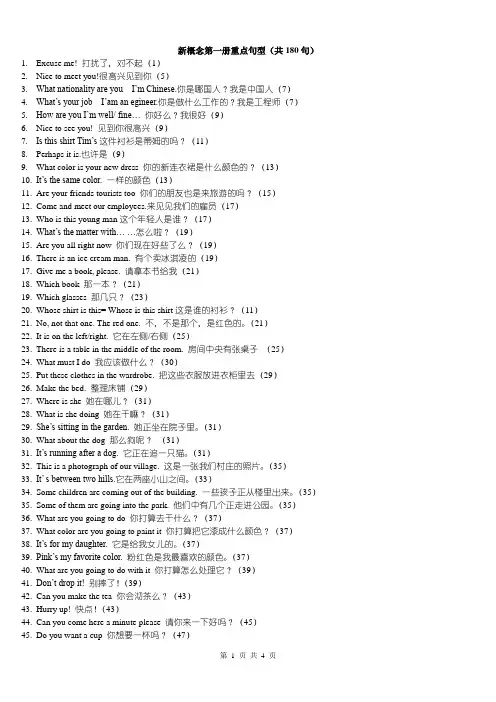
新概念第一册重点句型(共180句)1.Excuse me! 打扰了,对不起(1)2.Nice to meet you!很高兴见到你(5)3.What nationality are you I’m Chinese.你是哪国人?我是中国人(7)4.What’s your job I’am an egineer.你是做什么工作的?我是工程师(7)5.How are you I’m well/ fine…你好么?我很好(9)6.Nice to see you! 见到你很高兴(9)7.Is this shirt Tim’s这件衬衫是蒂姆的吗?(11)8.Perhaps it is.也许是(9)9.What color is your new dress 你的新连衣裙是什么颜色的?(13)10.It’s the same color.一样的颜色(13)11.Are your friends tourists too 你们的朋友也是来旅游的吗?(15)e and meet our employees.来见见我们的雇员(17)13.Who is this young man这个年轻人是谁?(17)14.What’s the matter with……怎么啦?(19)15.Are you all right now 你们现在好些了么?(19)16.There is an ice cream man. 有个卖冰淇凌的(19)17.Give me a book, please. 请拿本书给我(21)18.Which book 那一本?(21)19.Which glasses 那几只?(23)20.Whose shirt is this= Whose is this shirt这是谁的衬衫?(11)21.No, not that one. The red one. 不,不是那个,是红色的。
(21)22.It is on the left/right. 它在左侧/右侧(25)23.There is a table in the middle of the room. 房间中央有张桌子(25)24.What must I do 我应该做什么?(30)25.Put these clothes in the wardrobe. 把这些衣服放进衣柜里去(29)26.Make the bed. 整理床铺(29)27.Where is she 她在哪儿?(31)28.What is she doing 她在干嘛?(31)29.She’s sitting in the garden.她正坐在院子里。
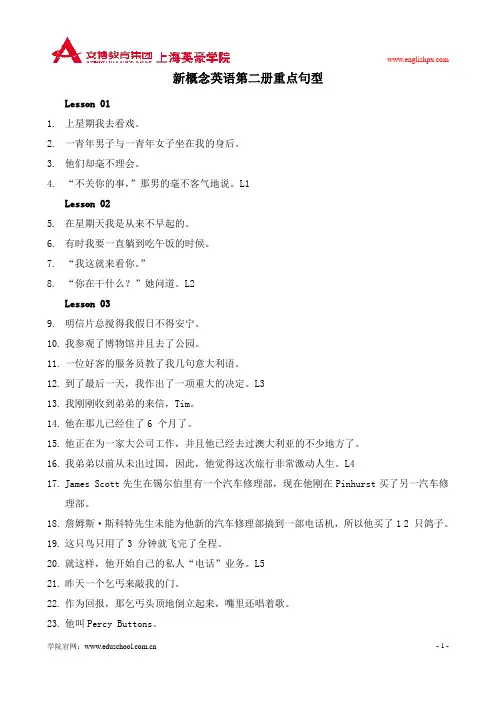
新概念英语第二册重点句型Lesson 011.上星期我去看戏。
2.一青年男子与一青年女子坐在我的身后。
3.他们却毫不理会。
4.“不关你的事,”那男的毫不客气地说。
L1Lesson 025.在星期天我是从来不早起的。
6.有时我要一直躺到吃午饭的时候。
7.“我这就来看你。
”8.“你在干什么?”她问道。
L2Lesson 039.明信片总搅得我假日不得安宁。
10.我参观了博物馆并且去了公园。
11.一位好客的服务员教了我几句意大利语。
12.到了最后一天,我作出了一项重大的决定。
L313.我刚刚收到弟弟的来信,Tim。
14.他在那儿已经住了6 个月了。
15.他正在为一家大公司工作,并且他已经去过澳大利亚的不少地方了。
16.我弟弟以前从未出过国,因此,他觉得这次旅行非常激动人生。
L417.James Scott先生在锡尔伯里有一个汽车修理部,现在他刚在Pinhurst买了另一汽车修理部。
18.詹姆斯·斯科特先生未能为他新的汽车修理部搞到一部电话机,所以他买了1 2 只鸽子。
19.这只鸟只用了3 分钟就飞完了全程。
20.就这样,他开始自己的私人“电话”业务。
L521.昨天一个乞丐来敲我的门。
22.作为回报,那乞丐头顶地倒立起来,嘴里还唱着歌。
23.他叫Percy Buttons。
24.他每月对这条街上的每户人家光顾一次,总是请求给他一顿饭和一杯啤酒。
L625.飞机误点了,侦探们在机场等了整整一上午。
26.他们正期待从南非来的一个装着钻石的贵重包裹。
27.这时两个侦探把住门口,另外两个侦探打开了包裹。
28.令他们吃惊的是,那珍贵的包裹里面装的全是石头和沙子。
L729. Joe Sanders拥有我们镇上最漂亮的花园。
30.几乎每个人都参加每年举办的“最佳花园竞赛”,而每次都是Joe获胜。
31. Bill Frith的花园比Joe的花园大。
32. Bill比Joe也更勤奋,种植的花卉和蔬菜也最多,但Joe的花园更富有情趣。
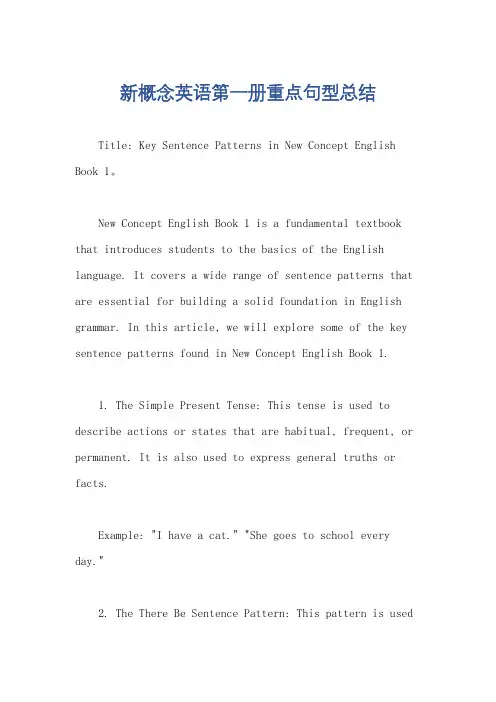
新概念英语第一册重点句型总结Title: Key Sentence Patterns in New Concept English Book 1。
New Concept English Book 1 is a fundamental textbook that introduces students to the basics of the English language. It covers a wide range of sentence patterns that are essential for building a solid foundation in English grammar. In this article, we will explore some of the key sentence patterns found in New Concept English Book 1.1. The Simple Present Tense: This tense is used to describe actions or states that are habitual, frequent, or permanent. It is also used to express general truths or facts.Example: "I have a cat." "She goes to school every day."2. The There Be Sentence Pattern: This pattern is usedto express the existence of something or someone in a particular place.Example: "There is a book on the table." "There are two cats in the garden."3. The Simple Past Tense: This tense is used to describe actions or events that have already happened in the past.Example: "I went to the park yesterday." "She bought a new dress last week."4. The Simple Future Tense: This tense is used to express actions or events that will happen in the future.Example: "I will go to the doctor tomorrow." "They will meet at the station at 10 a.m."5. The Present Continuous Tense: This tense is used to describe actions that are happening now or are in progress.Example: "I am studying now." "She is cooking dinner."6. The Basic Question Formation: Questions in English are formed by inverting the subject and verb. This pattern is used for yes/no questions and wh-questions.Example: "Are you a student?" "What is your name?"7. Imperative Sentences: These sentences are used to give commands or make requests. They are formed by using the base form of the verb.Example: "Close the door, please." "Don't forget to bring your book."8. The Basic Affirmative and Negative Sentences: Affirmative sentences express a positive statement, while negative sentences express a denial or opposition.Example: "I like coffee." (Affirmative) "I don't like coffee." (Negative)。

1.This is my boy friend, Tim. He is a police officer.2.This is not your room. That is my room.3.Is this my room? Is this not your ball pen?4.Is that not your raincoat?5.I miss my grandmother very much. Thank you so much.6.Here is your air ticket and passport. Here is your office.7.Your room number is 204. My cell phone number is 110.8.Is this your daughter? Is that your umbrella?9.Nice/ glad /good to meet you.10.This is Miss Li. She is our office assistant.11.Is your boss Japanese or Korean?He is Korean. My boss is Korean, too.12.What make is your new car?What make is your boy friend’s car? It is a Benz.13.Is it an English car or an American car?It’s an American car. It’s a Ford.14.Are you a new comer? Is your husband an engineer?15.What is your job? What’s your father’s job? He is a policeman.What’s your elder sister’s job? She is an air hostess.16.Are you Davy? What’s your name? What’s your boss’s name?17.What’s your girl friend’s name? Her name is Lily.18.Is your boy friend American? I s he a doctor? What’s his job?19.Is your father a taxi driver or a bus driver? He is a taxi driver.20.What’s your job? What’s your mother’s job? She is a housewife.21.What nationality are you? What is your nationality? I’m French.22. What nationality is your boss? Is your boss French?No, he isn’t. He’s German.23.How are you today? How is your girl friend? How’s your work?24.How do you do? How are you doing?25.I’m not very well today. Her English is not very good.26.Look, that man is so fat. Look at that man, he is so fat.27.Look at your hands, they are so dirty.Look at your boy friend, he is so lazy.28.Is your boy friend fat or thin? He is fat.Her boy friend is short and fat.29.Whose cell phone is this? Whose is this cell phone?It’s my big brother’s.30.Perhaps our boss isn’t in the office.Perhaps this magazine is Tim’s.31.Here it is. Here you are. Here they are.32.The house is my son’s. Is the house your son’s?The dress on the bed is my daughter’s.33.What colour is your new coat? It’s gray and black.Is your car blue? Is your car blue or green?34.My hat and your hat are the same clour. We live in the same city.e and meet my teacher. Come and sit down here.Come upstairs and see it.36.My friends are tourists. Their cases are in my room.37.What colour are your trousers? They are white.My shoes are white, too.38.The children are not hard-working at school.The employees are so hard-working in the office.39.Who are you? Who is your boss? Who is that young girl?40.What are their jobs? They are air hostesses.41.What’s the matter, Lily? --- I’m tired and thirsty.I’m tired of my new boss.42.One ticket to Xujiahui, please. Two ice creams, please.43.Look at your shoes, they are so dirty.44.Are my trousers short or long? They are long.45.Which is your book? Which bag is your mum’s?46.Which one is Davy’s?47.Give me a newspaper. Give me the book on the shelf.48.Give him your umbrella. Give this book to your teacher.。
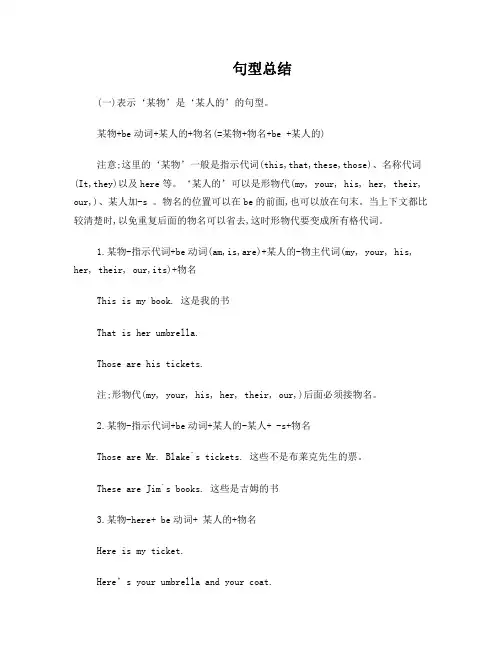
句型总结(一)表示‘某物’是‘某人的’的句型。
某物+be动词+某人的+物名(=某物+物名+be +某人的)注意;这里的‘某物’一般是指示代词(this,that,these,those)、名称代词(It,they)以及here等。
‘某人的’可以是形物代(my, your, his, her, their, our,)、某人加-s 。
物名的位置可以在be的前面,也可以放在句末。
当上下文都比较清楚时,以免重复后面的物名可以省去,这时形物代要变成所有格代词。
1.某物-指示代词+be动词(am,is,are)+某人的-物主代词(my, your, his, her, their, our,its)+物名This is my book. 这是我的书That is her umbrella.Those are his tickets.注;形物代(my, your, his, her, their, our,)后面必须接物名。
2.某物-指示代词+be动词+某人的-某人+ -s+物名Those are Mr. Blake`s tickets. 这些不是布莱克先生的票。
These are Jim`s books. 这些是吉姆的书3.某物-here+ be动词+ 某人的+物名Here is my ticket.Here’s your umbrella and your coat.Here’s Tim’s shirt.4.某物-名称代词+be + 某人的注:当语境非常清楚的时候,某物可以是人称代词,并且具体的物名可以省去It’s his.They are Tim’sThis is mine.It’s my s hirt.(二)表示某人的国籍的句型。
某人+be动词+国籍1.某人-人称代词(I ,you ,she ,he ,they, our, we)+be动词(is,am ,are )+国籍She`s German. 她是德国人You are Swedish.I’m French.They are Danish.2.某人-人名+be动词+国籍Tim is English.Naoko is Japanese.3.某人-其它形式+be动词+国籍Miss Sophie is French.The children are Chinese.Tim and Jim are German.Mr. Blake and his wife are American.(三)表示‘某人’是什么的工作的句型。
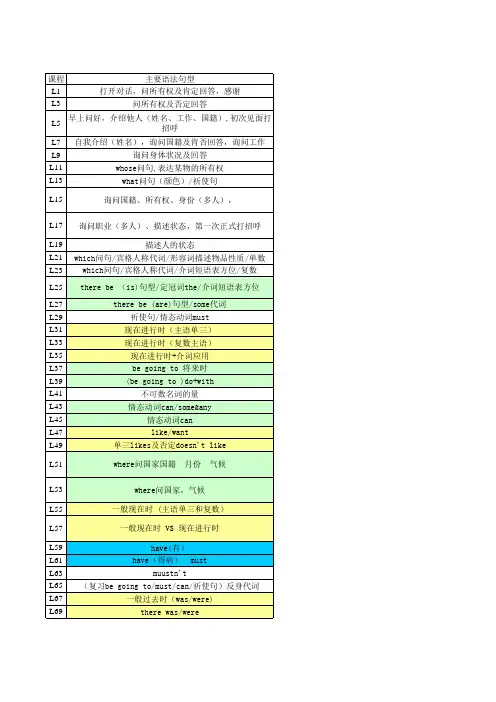
课程主要语法句型L1打开对话,问所有权及肯定回答,感谢L3问所有权及否定回答L5早上问好,介绍他人(姓名、工作、国籍),初次见面打招呼L7自我介绍(姓名),询问国籍及肯否回答,询问工作L9询问身体状况及回答L11whose问句,表达某物的所有权L13what问句(颜色)/祈使句L15询问国籍、所有权、身份(多人),L17询问职业(多人)、描述状态,第一次正式打招呼L19描述人的状态L21which问句/宾格人称代词/形容词描述物品性质/单数L23which问句/宾格人称代词/介词短语表方位/复数L25there be (is)句型/定冠词the/介词短语表方位L27there be (are)句型/some代词L29祈使句/情态动词mustL31现在进行时(主语单三)L33现在进行时(复数主语)L35现在进行时+介词应用L37be going to 将来时L39(be going to )do+withL41不可数名词的量L43情态动词can/some&anyL45情态动词canL47like/wantL49单三likes及否定doesn't likeL51where问国家国籍 月份 气候L53where问国家,气候L55一般现在时 (主语单三和复数)L57一般现在时 VS 现在进行时L59have(有)L61have(得病) mustL63muustn'tL65(复习be going to/must/can/祈使句)反身代词L67一般过去时(was/were)L69there was/wereL71一般过去时(实义动词规则变化)L73一般过去时(实义动词不规则变化)L75一般过去时 VS 一般现在时L77on/at介词短语表时间/复习have、can、mustL79need/have got/mustL81have(吃、喝\吸)L83现在完成时(过去动词had(上一课have的过渡)L85现在完成时(影响)L87现在完成时 VS 一般过去时L89现在完成时(表持续) for sinceL91(一般过去时 现在完成时)一般将来时(will)L93一般过去时 VS 一般将来时L95一般将来时L97belong toL99宾语从句L101间接引语L103宾语从句 too enough veryL105(动词不定式)want sb to.../tell sb toL107形容词比较级和最高级(规则)L109形容词比较级和最高级(不规则)L111形容词原级比较((not)as..as,比较级、最高级L113any、no、either、none、neither、soL115不定代词L117when、whileL119过去完成时L121定语从句L123定语从句L125have to/don't need toL127must be/can't be表肯定的猜测L129must have been/can't have been...对过去肯定的猜测L131may/might表一种可能性L133间接引语L135间接引语(情态动词)L137if条件状语从句(将来)L139宾语从句(if/when/why/what)L141被动语态(一般现在时和一般过去时)L143被动语态(现在完成时和一般将来时)主要内容课程excuse me. Is this your handbag? Yes, it is. Thank you very much.L2 Is this your umbrella? No, it isn't.L4 Good morning! This is Miss Sophie Dupont. Sophie is a new student. She is French. Nice toL6 meet you.Are you French?Yes, I am./No, I am not. What nationality are you? What's your job?L8 How are you? I am fine. How is Emma? She is fine.L10 Whose shirt is that? This is my shirt. It's not my shirt.L12 What color's your new dress? It's green.L14Are you Swedish? No, we are not. Are these your cases? No, they aren't. Are you tourists? Yes,L16 we are.What are their jobs? They're keyboard operators. Those women are very hard-working. How doL18 you do?We're tired and thirsty. No, we aren't. Yes, we are. Are you all right now?L20 Give me a book please, Jane. Which book? The red one.L22 Give me some glasses please, Jane. Which glasses? The ones on the shelf.L24 There is a cooker in the kitchen. The cooker is blue.L26 There are some magazines on the television.L28 Come in,Amy. What must I do,Mrs.Jones?L30 She is sitting under the tree.L32 They are walking over the bridge.L34 Some children are coming out of the building.L36 I'm going to paint it. I'm going to paint it pink.L38 What are you going to do with it? I'm going to put it here, in front of the window.L40 A piece of cheese. A loaf of bread. A bar of soap. A bottle of milk.L42 Is there any waer in this kettle? There are some cups in the cupboard.L44 Can you type this letter for the boss please, Pamela? I can't type this letter.L46 Do you want any milk? I don't like milk in my coffee.L48 My husband likes steak, but he doesn't like chicken.L50Where do you come from? I come from Greece. What's the weather like in spring? It's oftenL52 windy in March....It's often wet in the West. I like spring and summer. The days are long and the nights are short.L54 The sun rises early.In the morning, Mr. Sawyer goes to work and the children go to school.L56It's ten o'clock. Mrs Sawyer usually stays at home in the morning,but this morning, she is goingL58 to the shops.Do you have any writing paper? I don't have any small pads. I only have large ones.L60He had a bad cold, so he must stay in bed.L62You mustn't get up yet. Must he stay in bed?L64Enjoy yourself! We always enjoy ourselves.L66I was at the greengrocers. Were you at the butcher's?L68in 1995,there was a very big race. There were twenty cars in the race.L70He telephoned my four times yesterday. My boss answered the telephone.But I didn't answerL72 the phone.Last week Mrs. Mills went to London. Then he put his hand into his pocket and took out aL74 phrasebook.We had some shoes like those a month ago, but we don't ahve any now.L76Can you come at 10 a.m. on Monday ,April 24th? Do you have an appointment. I have aL78 toothache. I must see...I must go to the grocer's. We haven't got much tea or coffee. We need some meat.L80 We can have dinner at seven o'clock. We had roast beef and potatoes.L82 I've just had a cup.I've already had lunch.L84 Have you just been to the cinema? I've already seen it.L86 I brought it here three days ago. Have your mechanics finished yet?L88 I've lived here for twenty years. I've been here since 1976.L90 Will you see Ian today, Jenny? Has Ian sod his house yet? He sold it last week.L92 He was in the R.A F. He will fly to New York next month.L94 What time will the next train leave?L96 This case doesn't belong to me.L98 The doctor says that he will come at once. I'm sure that you need an X-ray.L100 He says he's just arrived in Scotland.L102The questions were very easy. They were too difficult for me. The English and Maths papersL104 weren't easy enough for me.I want her to come to my office. Tell her to come at once. I want her.L106 It's smaller than the blue one.This is the largest dress in the shop.L108 Just a little,please. Less than that. Eat more and smoke less.L110It's not as good as the expensive one. The other model's more expensive.It's the most expensiveL112 model in the shop.I've got no small change.I've got none. I haven't got any either. Neither can I. So have I.L114Isn't there anyone at home? Everything's very quiet. Nothing at all.Everyone's in the garden.L116 Everybody wants to..When my husband was going into the dining room this morning, he dropped some coins on theL118 floor. While we were...Tommy found ....After they had entered the house, they went into the dining room.L120 The lady who is standing behind the counter.L122 They are people I met during the trip.L124 Do you have to water it now? You don't need to water the garden.L126 It must be Karen Marsh, the actress. It can't be.L128 You must have been driving at seventy miles an hour. I can't have been.L130 We may go abroad. We might not go anywhere.L132 She told me she had just made a new film.She told reporters she felt very tired.L134 She said she couldn't make up her mind.L136 If I win a lot of money I'll buy you a mink coat.L138I said I would be at your house at six o'clock. My wife wants to know if Mary needs any help.IL140 don't know what you're talking about.Last week, my four-year-old daughter,Sally,was invited to a children's party.L142Vistors have been asked to keep the woods clean and tidy.L144操练内容物品人、物品车牌职业形容词物主代词颜色国籍,颜色职业(复数)(主语多人)形容词宾格代词,形容词宾格单词、物品there be句型,形容词描述物品性质或状态there be句型,介词短语表方位祈使句、must特殊疑问句单三(he/she/it)现在进行时复数(they,we,you)现在进行时现在进行时+介词(表方位)be going to与be doing对比do with sth.Is there+a/any(不可数名词)Are there any/Is there any...?can/can'tlike/want/序数词likes/doesn't likeWhat nationality? e from? What nationality? e from?一般现在时时间(整点)、一般现在时 VS 现在进行时时间(整点)、Do you have any?have(得病) mustmustn't时间(half\quarter)/日期/反身代词时间(非整点)、was/were was/were+on/in/at表示的过去时间过去时间/一般过去时(规则动词)一般过去时(不规则动词)过去时间短语/一般过去时at/on/in表时间I must go to... /Need/have gothave\had(吃、喝\)(做、从事)Have you had...?have done(规则动词的过去分词)have done(不规则动词的过去分词)have done(不规则动词的过去分词)将来时间/will dodid VS willago VS in..time(时间)/did VS willbelong to VS 名词性物主代词宾语从句宾语从句too enough very(动词不定式)(don't)want sb to.../tell sb to 形容词、比较级、最高级(规则)形容词、比较级、最高级(不规则)形容词((not)as..as,比较级、最高级(more/the most)any、no、either、none、neither、so every/no/any/some+body/one/thing/wherewhen/while/just as过去完成时定语从句(who(whom),which,that) who(whom)、which、that主语+系动词全省略,宾语时省略代词have to/don't need tomust be/can't be表肯定的猜测must have been/can't have been...may be/may have been/He said/told me(that) heHe said/told me(that) he+情态动词if(将来/can)He wants to know if/why/what/when被动语态(一般现在时和一般过去时)被动语态(现在完成时和一般将来时)。
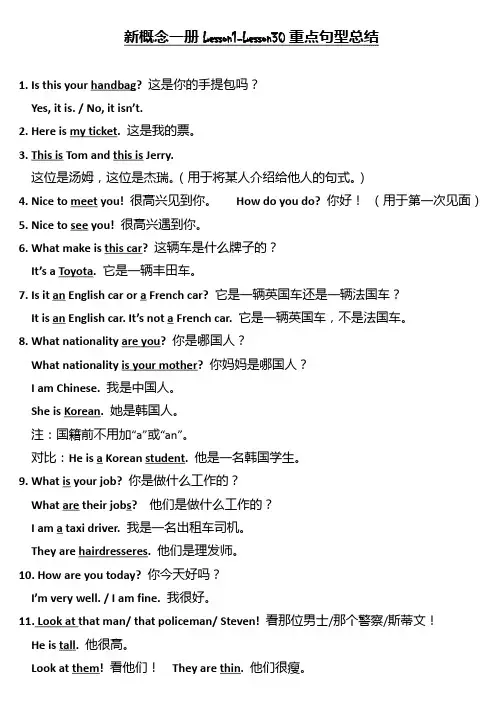
新概念一册Lesson1-Lesson30重点句型总结1. Is this your handbag? 这是你的手提包吗?Yes, it is. / No, it isn’t.2. Here is my ticket. 这是我的票。
3. This is Tom and this is Jerry.这位是汤姆,这位是杰瑞。
(用于将某人介绍给他人的句式。
)4. Nice to meet you! 很高兴见到你。
How do you do? 你好!(用于第一次见面)5. Nice to see you! 很高兴遇到你。
6. What make is this car? 这辆车是什么牌子的?It’s a Toyota. 它是一辆丰田车。
7. Is it an English car or a French car? 它是一辆英国车还是一辆法国车?It is an English car. It’s not a French car. 它是一辆英国车,不是法国车。
8. What nationality are you? 你是哪国人?What nationality is your mother? 你妈妈是哪国人?I am Chinese. 我是中国人。
She is Korean. 她是韩国人。
注:国籍前不用加“a”或“an”。
对比:He is a Korean student. 他是一名韩国学生。
9. What is your job? 你是做什么工作的?What are their jobs? 他们是做什么工作的?I am a taxi driver. 我是一名出租车司机。
They are hairdresseres. 他们是理发师。
10. How are you today? 你今天好吗?I’m very well. / I am fine. 我很好。
11. Look at that man/ that policeman/ Steven! 看那位男士/那个警察/斯蒂文!He is tall. 他很高。
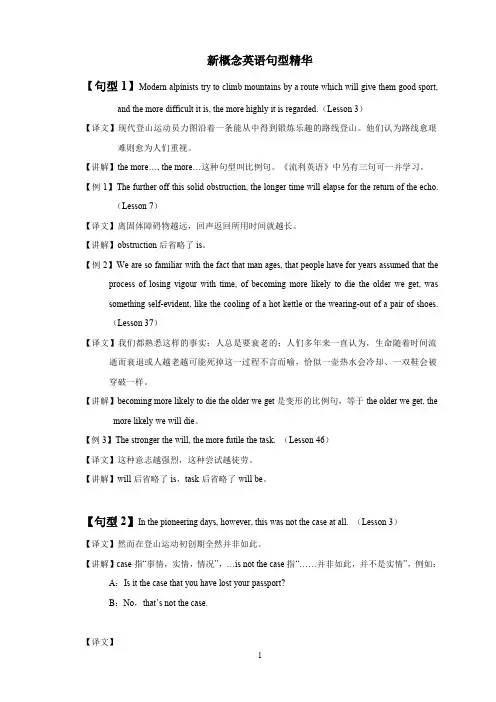
新概念英语句型精华【句型1】Modern alpinists try to climb mountains by a route which will give them good sport, and the more difficult it is,the more highly it is regarded.(Lesson3)【译文】现代登山运动员力图沿着一条能从中得到锻炼乐趣的路线登山。
他们认为路线愈艰难则愈为人们重视。
【讲解】the more…,the more…这种句型叫比例句。
《流利英语》中另有三句可一并学习。
【例1】The further off this solid obstruction,the longer time will elapse for the return of the echo.(Lesson7)【译文】离固体障碍物越远,回声返回所用时间就越长。
【讲解】obstruction后省略了is。
【例2】We are so familiar with the fact that man ages,that people have for years assumed that the process of losing vigour with time,of becoming more likely to die the older we get,was something self-evident,like the cooling of a hot kettle or the wearing-out of a pair of shoes.(Lesson37)【译文】我们都熟悉这样的事实:人总是要衰老的;人们多年来一直认为,生命随着时间流逝而衰退或人越老越可能死掉这一过程不言而喻,恰似一壶热水会冷却、一双鞋会被穿破一样。
【讲解】becoming more likely to die the older we get是变形的比例句,等于the older we get,the more likely we will die。

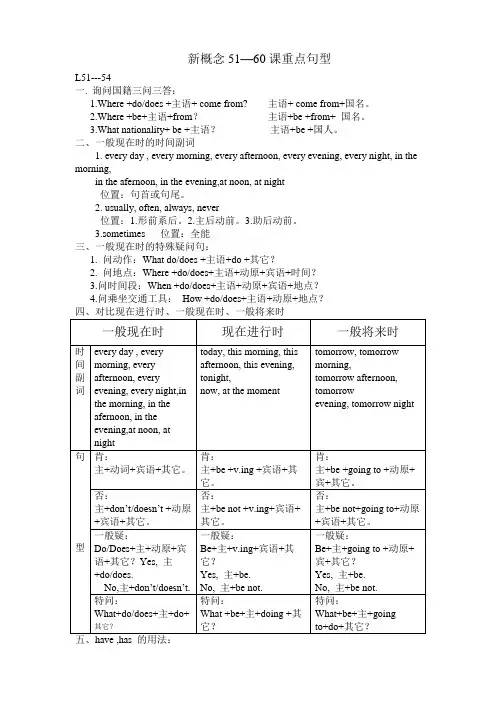
新概念51—60课重点句型L51---54一.询问国籍三问三答:1.Where +do/does +主语+ come from? 主语+ come from+国名。
2.Where +be+主语+from?主语+be +from+ 国名。
3.What nationality+ be +主语?主语+be +国人。
二、一般现在时的时间副词1. every day , every morning, every afternoon, every evening, every night, in the morning,in the afernoon, in the evening,at noon, at night位置:句首或句尾。
2. usually, often, always, never位置:1.形前系后。
2.主后动前。
3.助后动前。
3.sometimes 位置:全能三、一般现在时的特殊疑问句:1. 问动作:What do/does +主语+do +其它?2. 问地点:Where +do/does+主语+动原+宾语+时间?3.问时间段:When +do/does+主语+动原+宾语+地点?4.问乘坐交通工具:How +do/does+主语+动原+地点?四、对比现在进行时、一般现在时、一般将来时一般现在时现在进行时一般将来时时间副词every day , everymorning, everyafternoon, everyevening, every night,inthe morning, in theafernoon, in theevening,at noon, atnighttoday, this morning, thisafternoon, this evening,tonight,now, at the momenttomorrow, tomorrowmorning,tomorrow afternoon,tomorrowevening, tomorrow night句型肯:主+动词+宾语+其它。

新概念英语1-6课句型复习例1: This is my handbag. 这是我的手提包。
否定句: This is not my handbag.一般疑问句: Is this your handbag?(注:第一称 my our 变成一般疑问句要变成your) 肯定回答: Yes, it is.否定回答: No, it isn’t.练习1: This is our teacher.否定句:一般疑问句:肯定回答:否定回答:练习2: This is my pencil.否定句:一般疑问句:肯定回答:否定回答:例2: I am a student. 我是一名学生否定句: I am not a student.一般疑问句: Are you a student?(注:第一称I am变成一般疑问句整体变are youWe are 变成一般疑问句整体变are you) 肯定回答: Yes, I am否定回答: No, I am not(切记不可缩写amn’t. X)练习3: I am a new student. 我是一名新同学。
否定句:一般疑问句:肯定回答:否定回答:练习4: we are Chinese. 我们是中国人。
否定句:一般疑问句:肯定回答:否定回答:例3: It is a Volvo. 这是一辆沃尔沃车。
否定句: It is not a Volvo.一般疑问句: Is it a Volvo?肯定回答: Yes, it is.否定回答: No, it isn’t.划线提问:What make is it?( what make 用于对车牌提问) 练习5 : It is a Toyota. 这是一辆丰田车。
否定句:一般疑问句:肯定回答:否定回答:划线提问:人称代词一览表:用法展现:她喜欢他。
She likes him.他喜欢她。
He likes her.我喜欢你。
I like you.你喜欢我。
新概念英语第二册重点语法句型新概念英语第二册是初学者学习英语的重要教材,其中的语法和句型是非常重要的。
以下是重点语法句型及其解析。
1. 动词的不定式英语中的不定式是以to开头的动词形式,常常用来表示目的、意图、结果等。
例如:- I want to learn English.(我想学英语。
)- He went to the store to buy some food.(他去商店买了一些食物。
)- She studies hard to pass the exam.(她努力学习以通过考试。
)2. 现在完成时现在完成时是表示过去发生过的动作与当前的关联。
通常是用have/has+过去分词构成,例如:- I have eaten breakfast.(我吃了早餐。
)- They have been to London many times.(他们去过很多次伦敦。
)- Have you ever tried sushi?(你试过寿司吗?)3. 过去完成时过去完成时是表示过去动作在另一个过去时间点之前完成。
常常是用had+过去分词构成。
例如:- They had finished their homework before I arrived.(我到达之前他们已经完成了作业。
)- The movie had already started when we got there.(当我们到达那里时,电影已经开始了。
)4. 被动语态被动语态是指动作的承受者比较重要,而动作的执行者不那么重要。
被动语态的构成是be+过去分词。
例如:- The cake was made by my grandma.(蛋糕是我奶奶做的。
)- The letter will be sent tomorrow.(信件明天会被寄出。
)- The thief was caught by the police.(小偷被警察抓住了。
)5. 虚拟语气虚拟语气是表示假设的语气,常常用在宾语从句、条件从句和表达愿望的句子中。
新概念英语黄金句型新概念英语黄金句型11、Despite her great age, she was very graceful indeed, but, the archaeologists have been unable to discover her identity.尽管上了年纪,但体态确实优美,不过,考古工作者至今未能确定这位女神的身份。
12、These days, people who do manual work often receive far more money than people who work in offices.如今,从事体力劳动的人的收入一般要比坐办公室的人高出许多。
13、People who work in offices are frequently referredto as "white-collar workers" for the simple reason thatthey usually wear a collar and tie to go to walk.坐办公室的人之所以常常被称作"白领工人",就是因为他们通常是穿着硬领白衬衫,系着领带去上班。
14、This can give rise to curious situations.这能增加好奇心。
15、He left home dressed in a smart black suit.他穿着一身漂亮的黑色套装出了家门。
16、His wife has never discovered that she married a dustman and she never will.他的妻子从未发现自己嫁给了一个她从来不愿意嫁的清洁工。
17、He will be earning only half as much as he used to, but, he feels that he rise in status is well worth the loss of money.他将来挣的`钱只有他现在的一半,不过他觉得,地位升高了,损失点儿钱也值得。
新概念英语第三册重点句式1 表示“无论”的让步状语从句。
1) 疑问词+ever (whenever, wherever, whoever, whichever, whatever ...)2) no matter + 疑问词L1 Wherever it went, it left behind it a trail of dead deer and small animals like rabbits.L14 Whenever the Italian city-states were at war with each other, Hawkwood used to hire his soldiers to princes who were willing to pay the high price he demanded.L8 Now that a tunnel has been built through the mountains, the Pass is less dangerous, but each year, the dogs are still sent out into the snow whenever a traveller is in difficulty.L28 No matter how hard I tried, it was impossible to fill this beautiful pen with ink and to this day it has never written a single word!L29 No matter where you live, you would find it difficult not to laugh at, say, Charlie Chaplin's early films.L39 No matter what the conditions were, he believed that a car should be driven as fast as it could possibly go.L54 No matter how much we like honey, or how much we have read about the uncanny sense of direction which bees possess, we have a horror of being stung.2 表示“总是做某事”的句式。
1) be always doing sth.(多贬义)2) be forever doing sth.(多贬义)3) keep (on) doing sth. (多贬义)4) never fail to do sth. (多褒义)L2 Our vicar is always raising money for one cause or another, but he has never managed to get enough money to have the church clock repaired.L41 He is forever talking about the friendly people, the clean atmosphere, the closeness to nature and gentle pace of living.L29 From the moment he arrived there, he kept on pestering his doctor to tell him when he would be able to go home.L9 Cats never fail to fascinate human beings.3 表示“称呼某人为…”的句式。
1) refer …to …2) call ……3) address …as …4) know …as …L4 People who work in offices are frequently referred to as "white-collar workers' for the simple reason that they usually wear a collar and tie to go to work.L4 From now on, he will wear a suit all day and others will call him 'Mr. Bloggs', , not 'Alf'.L4 练习12L21 Because of this, they were known as ‘prizefighters’.L14 He soon made a name for himself and came to be known to the Italians as Giovanni Acuto.L31 He was known to us all as Dickie and his eccentricity had become legendary long before he died.4 介词+名词+同位语从句= 普通从属连词L4 People who work in offices are frequently referred to as "white-collar workers' for the simple reason that they usually wear a collar and tie to go to work.L52 Despite the fact that the bottle is tinted a delicate shade of green, an observant visitor would soon noticethat it is filled with what looks like a thick, grayish substance.5 表示“愿意不愿意做某事”。
1) be willing / ready / prepared to do …2) be unwilling / unprepared / reluctant to do …L4 Such is human nature, that a great many people are often willing to sacrifice higher pay for the privilege of becoming white-collar workers.NCE4 L28 The majority of the patients attending the medical out-patients departments of our hospitals feel that they have not received adequate treatment unless they are able to carry home with them some tangible remedy in the shape of a bottle of medicine, a box of pills, or a small jar of ointment, and the doctor in charge of the department is only too ready to provide them with these requirements.L41 Why people are prepared to tolerate a four-hour journey each day for the dubious privilege of living in the country is beyond me.L48 Though he was reluctant to do so at first, we eventually persuaded him to take us.6 独立结构(with) + n. + 非谓语(doing / done / to do)L6 The silence was suddenly broken when a large car, with its headlights on and its home blaring, roared down the arcade.L6 One man stayed at the wheel while two others with black stocking over their faces jumped out and smashed the window of the shop with iron bars.L57 …, and at this point, according to my father, I should be looking at farms and cottages in a valley, with the spire of the church of our village showing in the far distancewith the spire of the church of our village showing in the far distance.L59 Collecting, by occupying spare time so constructively, makes a person contented, with no time (being) for boredom.7 “越…,就越…”句式“the + 比较级…,the + 比较级”be 动词常可省略L9 It seems that the further cats fall, the less they are likely to injure themselves.L43 Needless to say, the bigger the risk an insurance company takes, the higher the premium you will have to pay.8 表示“连接、联系”的句式1)connect …with / to …2)join …to …3)associate …with …L8 The Great St. Bernard Pass connects Switzerland to Italy.L17 The Verrazano Bridge, which was designed by Othmar Ammann, joins Brooklyn to Staten Island.L23 There are countless people who, ever since their early years, have learned to associate snails with food.9 表示“横穿某地”的句式1) cross + 宾语+ 方式状语2) 动词+ across + 宾语L8 Despite the new tunnel, there are still a few people who rashly attempt to cross the Pass on foot.L8 During the summer months, the monastery is very busy, for it is visited by thousands of people who cross the Pass in cars.L12 They quickly loaded a small rubber dinghy with food, matches, and tins of beer and rowed for a few miles across the Caribbean until they arrived at a tiny coral island.L20 In 1908 Lord Northcliff offered a prize of £1000 to the first man who would fly across the English Channel.10 表示“更喜欢…”的句式。